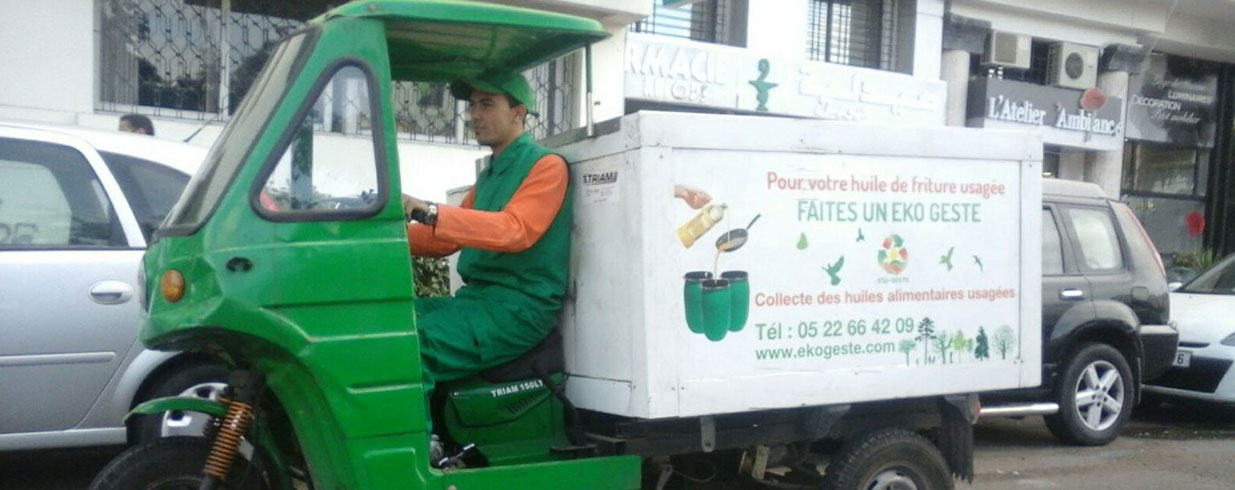Ekogeste digitalizes and automates the service of collection and recovery of Used Cooking Oil (UCO) from the food and hospitality industries (restaurant, café & hotel professionals). The digital service provides the community of recyclers with tools to improve service to their customers and ensure traceability.

Ekogeste, a digital collection service connecting waste producers with waste collectors
OBJECTIVES
The goal of the service is to connect oil waste generators to recyclers via digitalized tools and uberised logistics. The aim is to provide a reliable service ensuring proper data collection and traceability, and to establish a list of recycling companies.
BACKGROUND INFORMATION AND LOCATION
General information on the project sites:
• Surface of the site: 1,200 m²
• Capacity: 8,000 tonnes/yr.
• Quantities sent to recycling: 5000 tonnes/yr.
IMPLEMENTING BODIES
Ekogeste is a programme of INVEKO ENVIRONMENT, a Moroccan company specialised in waste services.
KEY STAKEHOLDERS INVOLVED
Collectors, Partners (restaurants, hotels, cafés, and catering businesses) & Salespeople
GENERAL CONTEXT
One litre of spilled UCO contaminates one million litres of water, which ultimately negatively affects soils and oceans, and the planet in general. Ekogeste diverts Used Cooking Oil from reaching the environment and supplies it to companies that use it to produce biofuel.
DESCRIPTION OF THE ACTIVITIES
The Ekogeste activity consists of collecting used oil from restaurants, cafés, hotels, catering businesses producing frying oils, organising the value chain for recycling and building a national database of UCO. The principle of Ekogeste is to connect producers of UCO (the HoReCa sector) with collectors of UCO waste.
This is done through a mobile application (a software), where customers and companies can request the collection of their used oil, but also through various activities aimed at making the recycling value chain fully operational.
The activity has developed around four main pillars:
Community development
• Connecting with the community of UCO producers via multi-channel media such as smartphone, WhatsApp, Facebook, Instagram.
• Digital community management.
• Distribution of gifts as part of the loyalty programme.
Supply chain
• Upgrading the services of informal UCO operators with training, vehicles, mobile phones, social security and various other benefits (“Happy collector” programme).
• Collection of UCO from food and hotel professionals.
• Centralisation of the UCO in the main warehouse.
Technology
• Monitoring of collectors and customers via the back office.
• Development of technological solutions adapted to the different actors.
• Creation of a database of recyclers.
Transformation
• Testing of the UCO (acidity, etc.) ensuring that the levels comply with international standards, criteria and requirements.
• Transport of the used oil to recyclers who will process them into biofuel.
FINANCING AND COST RECOVERY CONTEXT
The business model of Ekogeste is based on the sales of UCO to recyclers. The system works as follows:
• Inveko contributes to ‘transforming’ the collectors into micro-entrepreneurs (uberised logistics) and supplies them with equipment, material, and social advantages (a branded vehicle, a phone, an outfit, social security, etc.).
• The micro-entrepreneurs conduct their collection of UCO and invoice Inveko Environment for logistics services.
• Then the collected UCO is sold and/or exported to recyclers.
MAIN ACHIEVEMENTS AND RESULTS
The key results are the following:
Social inclusion of the UCO collectors:
• Number of collectors to date: 20
• 1 green job is created for every 300 active collection points
Environmental impact:
• Quantity of UCO collected since the start of Ekogeste: 5000 tonnes
• 1 litre of collected UCO = 1 million litres of water preserved and a decrease of 2.6 kg in terms of CO2 emissions
KEY FACTORS OF SUCCESS
The success of this action depends on several factors:
• The salespeople and their capacity to convince customers;
• The quality of the service: professionalism/reliability of collectors, time commitment, loyalty program activation, made possible by the “Happy Collectors” programme;
• Most of the professionals are paid instantly and in cash.
BOTTLENECKS, LIMITATIONS AND CHALLENGES
• Raising enough awareness and convincing the unconverted to adhere, by highlighting the positive environmental outcomes;
• Some stakeholders are resistant to change and reluctant to undergo the digital transformation;
• A shortage of cash impedes the ongoing operations of UCO collection: one of the ambitious challenges is to digitalize cash;
• Household UCO is an untouched ‘deposit’, which would require extensive sensitization programs and operational logistics and thus needs government subsidies to make it feasible and profitable.
LESSONS LEARNED AND REPLICABILITY
• The application must be as simple as possible to tailor to the less tech-savvy clients and increase and facilitate user-experience;
• Reliability is key for customer retention;
• The model is replicable and has been launched successfully in countries other than Morocco (UAE).
REFERENCES, LINKS TO FURTHER INFORMATION
Key information
Topic: separate collection, recycling
Waste fraction: Used Cooking Oil (UCO)
Target group: Restaurants, cafés, hotels, catering businesses
Instruments: Technology
Date of the implementation
From September 2020 to date
